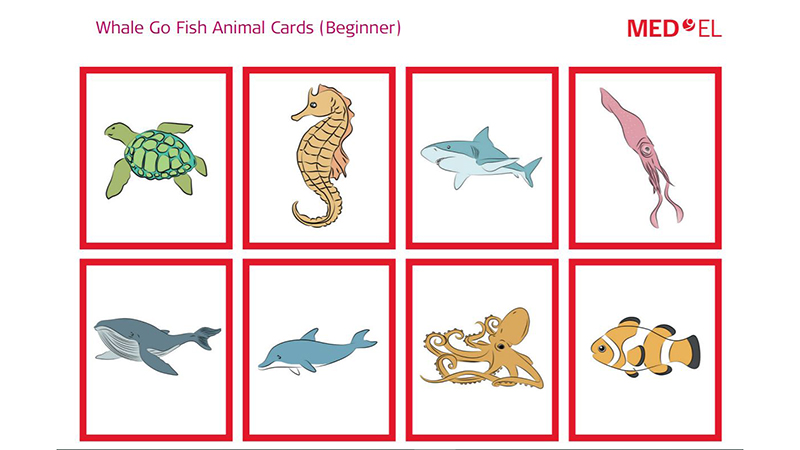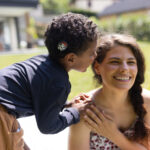MED-EL
Published May 13, 2020 | Last Update Mar 07, 2023
Keep Your Children Entertained While Building Their Listening and Speech Skills

Looking for a fun but productive way to keep the kids entertained? Here’s a new card game for you to play with your family, while also helping to develop your child’s listening, speech, and language skills.
Playing board and card games with your family offers many opportunities for teaching new vocabulary including mental state language, practicing listening and developing social skills such as sharing, taking turns and learning appropriate responses to winning and losing.
In this blog post, we will share some tips for playing card games at home with your child if they use hearing implants.
Simply download our “Whale Go Fish” cards to get started!
Instructions For Younger Children (ages 3 -4)
- Print the Whale Go Fish Animal Cards (Beginner) onto lightweight card. Check which way the pages came out, turn the page over and put them back into the paper tray of your printer and print Whale Go Fish Back Cards on the back.
- With your child, cut out one set of matching cards (one page of blue borders and one page of red borders). You might need to help your child with the cutting. Save the other set for later if desired.
- As you are cutting them, label each of the animals and talk more about the animals your child is interested in. Talk about what the animal looks like, how it moves, what it might like to eat or what it might feel like.
- Separate the cards into two piles, one red and one blue with the whale side up.
- Spread the red cards, whale side up out on the table. Organize the cards into two rows.
- Explain to your child the rules of the game: Explain that you must find two cards which are the same. You must take turns and wait for others to finish their turn, there is no cheating etc.
- Decide with your child and family who will go first. Maybe this will be the youngest or oldest player. Introduce language such as my turn, your turn, first, after, wait, who is next?
- The first player takes a card from the whale pile of blue cards. Say the name of the animal first and then show your child and the other players the picture. This is a strategy referred to as ‘Listening First’. As you talk first, this allows your child to focus their attention on listening, building a mental picture of the animal, before they see it.
- Talk about your thoughts and feelings while playing the game to teach these concepts to your child e.g., I hope I find a match! I think it will be this card. I wonder if it is here. This is mental state language.
- Turn over one red card on the table to see if you found a match. Introduce language such as same, match, not the same, different.
- If it is a match, pick it up and put your pair together in front of you.
- If it is not a match, pass the card to the next player and encourage them to turn over one red card to find the matching one. Pass the card around until the matching one is found.
- After finding a pair, the player to the left of the first player should ‘fish’ a new card from the whale card pile.
- When all of the cards are matched, count the number of pairs each player has. The player with the most pairs is the winner. Use this opportunity to model to your child the language for congratulating the winner e.g., Nice work, you won! And a phrase to commiserate with those who lost e.g., better luck next time or good game!
Instructions For Older Children (ages 5 plus)
- Print the Whale Go Fish Animal Cards (Intermediate or Advanced) onto lightweight card. Check which way the pages came out, turn the page over and put them back into the paper tray of your printer and print Whale Go Fish Back Cards on the back.
- With your child, cut out the cards (the first time you play you might like to try only 12 pairs of cards) and shuffle the pack well. You might need to help your child with the cutting.
- As you are cutting them, talk about each of the animals on the cards. Talk about how they move, their features, where they live and what they might eat for example.
- Deal four cards to each player, whale side up.
- Place the remaining cards in a pile in the middle. Use this opportunity to teach location words for where the cards will be placed e.g., next to, underneath, in front of, on top of, left, right.
- Explain the rules of the game to your child. Explain that you will take turns and must wait for the other players to complete their turn. Teach words such as first, after, next, my turn, your turn.
- Each player should pick up their cards and hold them keeping the pictures hidden from the other players.
- Explain that you must find two cards which are the same. One will have a red border, one will have a blue border.
- All players check to see if they have any matching pairs. If so put them on the table in front of you.
- Choose one of your cards and without showing the card ask the player to your left if they have the card with those two animals i.e. Do you have the turtle and the jellyfish? Or if you are playing with the Advanced Whale Go Fish Animal cards, three animals i.e. Do you have the turtle, the shark and the jellyfish? This is a great listening activity for your child to build their auditory memory. They must listen to the key words – the animal names, remember the animal names, look through their cards and then respond appropriately.
- If that player has the card, they should give it to you so you can place your pair on the table. If not, they should say “Whale go fish” and you pick up a whale card from the pile.
- The next person asks the player to their left.
- When there are no cards left in the pile, players may ask any other player for one of their cards.
- Talk about your thoughts and feelings while playing the game to teach these concepts to your child e.g., I hope I find a match! I think it will be this card. I wonder if it is here. This is mental state language. Using mental state language with your child will help them to understand these difficult words and support their theory of mind development.
- When all of the cards are matched, count the number of pairs each player has. The player with the most pairs is the winner. Use this opportunity to model to your child the language for congratulating the winner e.g., You have the most pairs. You are the winner! And a phrase to commiserate with those who lost e.g., better luck next time or maybe you will win the next game!
Looking for more rehab activities to try at home? Take a look at Build A Bus And Help Your Child’s Listening Skills!
See more activities in the theme of Whales and Sharks in our Lesson Kit 17. There are also many other activities with free printables available in our Lesson Kits.
MED-EL
Was this article helpful?
Thanks for your feedback.
Sign up for newsletter below for more.
Thanks for your feedback.
Please leave your message below.
Thanks for your message. We will reply as soon as possible.
Send us a message
Field is required
John Doe
Field is required
name@mail.com
Field is required
What do you think?
MED-EL



